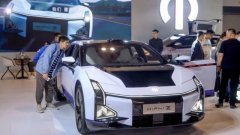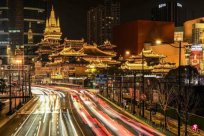The Thai automobile market, which has been considered a "Japanese position" for many years, has undergone crustal changes.Among the 780,000 cars sold in Thailand in 2023, there were 87,000 cars in China, with a market share of 11%, accounting for double digits.The top three Chinese cars are BYD, MG (MG) and Nezha; except MG, there are no production bases in Thailand.
China's pure electric vehicle (BEV) uses ACFTA to enter the Thai market by using ACFTA.In addition to ACFTA, the Chinese car leap in the Thai market also attributed to the Thai government's support policies for electric vehicles.
The Thai government is based on domestic production in 2024 or 2025, and provides economic incentives such as subsidies, reduction of goods taxes for imported electric vehicles, and actively carried out investment promotion activities.As a result, Chinese companies responded.Before the establishment of a production base, the electric vehicles made in China flowed into the Thai market after 2022.In 2023, electric vehicles sold 74,000 vehicles, raising the share of electric vehicles in the Thai automobile market from 1.2%in the previous year to 9.5%.In mid -2023, Marseille, Honda, and MG began to produce electric vehicles in Thailand. In 2023, electric vehicle production was only 164, but imported electric vehicles increased sharply.
The "critical quality theory" in the field of marketing sets the critical value of the explosive jump of goods as "16%of the market share". However, the market share of electric vehicles is 9.5%, and this level cannot be reached.However, this does not fully reflect the actual situation of all electric vehicles.There are still many topics in the field of commercial vehicles that need to be resolved.The re -calculating share of electric vehicles alone in the field of cars will greatly exceed the critical value of "critical quality theory", reaching 25.2%.In addition, the next -generation cars, including oil and electric hybrid vehicles (HEV) and plug -in hybrid vehicles (PHEV), account for 57.6%.The Thai sedan market can be described as changes in crust.
The reason for choosing Thailand as a production base in China
Enterprises that invest Chinese electric vehicles into the Thai market, except Tesla, have received electric vehicle subsidies from the Thai government.These companies will produce electric vehicles in Thailand in 2024 or 2025.The production of electric vehicles in Thailand was in dawn. In the middle of 2023, Marseille began production, and Honda and MG were also put into production at the end of the year.Entering 2024, Great Wall Motors began to produce "Ora" in January.During this year, BYD, Nezha, and GAC Ean New Energy (Aion) will join, and Changan Automobile will also enter local production in 2025.In addition to Thailand, these companies have also considered exports to members of the Asianianan, Australia, New Zealand and Europe.
The original Asian Jenan countries aimed at cultivating the national automotive industry and set up high tariff barriers.In Thailand, 80%of high tariffs are levied by the Most Western Treatment (MFN).However, in the trend of economic integration in the region, the AFTA Region (AFTA) was established, and tariffs were limited to the original Asia Dian'an.As a result, the functions of production bases in the region have reorganized. Thailand and Indonesia have grown into automotive production and export bases in the region. In other countries, countries to support the Yajia'an automobile industry by providing bulk materials (KD) production and major parts.
In the 192000, in the process of establishing a free trade agreement with foreign countries, except for countries with weak automotive industry foundations, tariff barriers were basically maintained.In other words, the cancellation or maintaining a car tariff is almost the exclusive privilege of the member states of the Asianiman.However, through the first ACFTA signed with the Foreign State Family House, Thailand's tariff barriers have a gap. After 2010, the electric vehicle tariffs are zero.
The electric vehicle market, which is separated by state -owned enterprises and private enterprises in China, has gathered in different sizes of the electric vehicle market. Due to excessive competition, the operating rate of equipment is sluggish and enter the era of elimination.For these companies, a little gap in the Thai market has a brilliant light for the survival of enterprises.Moreover, if the Thai government's electric vehicle rejuvenation policy is supported and produced locally, in addition to actively using the free trade agreement network built by Thai and Asia, it can also hang the European -made "Made in China" electric vehicle "" Made in China """Made in Thailand" brand.
Can you get the title of "Thailand Native", which has attracted much attention
In addition to the domestic market in Thailand, Chinese electric vehicle companies must effectively use the free trade agreement if they want to export.The use conditions for the use of free trade agreements are "maintaining a local value -added rate of 40%."Whether it is the degree of localization of battery production or the degree of use of Thai industrial integration, most parts need to be imported from China in the early stage of production, which is difficult to meet this condition.
If you cannot meet the "40%local value -added rate", most of the electric vehicles produced in Thailand will stay in the domestic market in Thailand.If there is a situation where the supply is too, the vicious price competition like China will affect the entire market.
If you meet the "40%local value -added rate", Chinese cars are identified as Thailand native, and will be exported to the region and outside the region through the Asian Simpan Free Trade Agreement Network. Auto companies in various countries and Thailand native Chinese cars will compete with each other.In any case, the Asian automobile industry will usher in a huge transition period.
The author is a professor at the Department of Political Economics and Economics of the Guoshi Museum of Japan, and a visitor professor at Thai and Japan University of Technology




